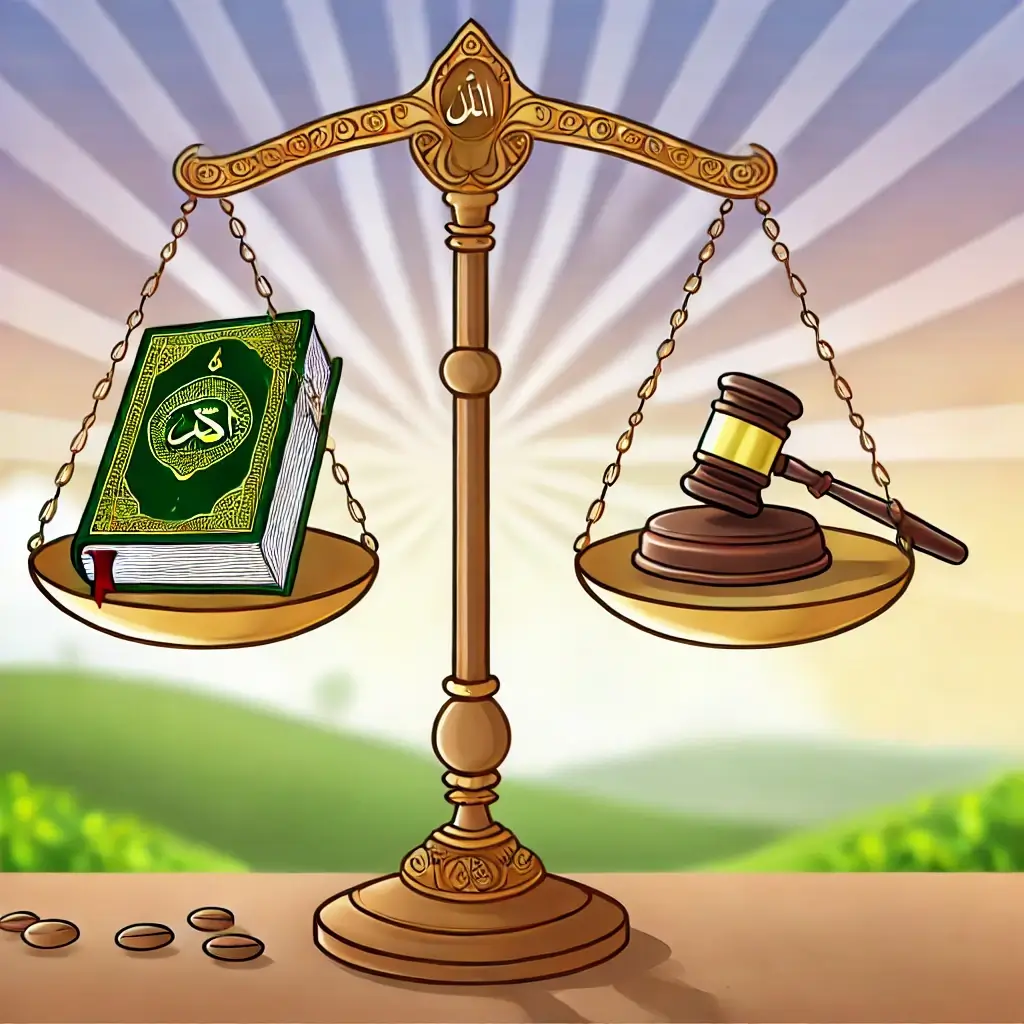Shariah law, often misunderstood and misrepresented, is the legal and ethical framework that guides the personal, social, and religious lives of Muslims. It is derived from two primary sources: the Quran (the holy book of Islam) and the Sunnah (the teachings and practices of the Prophet Muhammad, peace be upon him). Shariah law covers a wide range of areas, including personal conduct, family life, business ethics, and governance, and it emphasizes justice, compassion, and the welfare of individuals and society.
In this article, we will explore what Shariah law truly entails, how it governs the lives of Muslims, and its broader role in shaping an ethical and just society.
1. What Is Shariah Law?
The term Shariah comes from the Arabic word "Shari’a," which means a path to be followed. In its religious context, Shariah represents the divine law as revealed by Allah to guide humanity toward a just and righteous life. Shariah encompasses moral, ethical, social, and legal codes designed to foster a harmonious society and ensure that individuals live according to Allah’s will.
Shariah is not a monolithic legal code but a broad system of principles derived from sacred texts, with interpretations (known as Fiqh) varying based on cultural and regional practices. This flexibility allows for Shariah to be applied in a way that reflects the time, place, and circumstances of the people following it.
The Quran emphasizes the importance of following Allah’s guidance:
﴿ثُمَّ جَعَلْنَاكَ عَلَىٰ شَرِيعَةٍ مِّنَ الْأَمْرِ فَاتَّبِعْهَا وَلَا تَتَّبِعْ أَهْوَاءَ الَّذِينَ لَا يَعْلَمُونَ﴾
[ الجاثية: 18]
"Then We put you, [O Muhammad], on an ordained way concerning the matter [of religion]; so follow it and do not follow the inclinations of those who do not know."
(Quran 45:18)
Shariah’s primary purpose is to ensure justice, protect human dignity, and promote the welfare of individuals and society.
2. The Sources of Shariah Law
Shariah is derived from two main sources:
1. The Quran
The Quran is the most important source of Shariah. It provides the foundational principles of Islamic law and offers direct commands regarding various aspects of life, including worship, family matters, criminal justice, and business transactions. The Quran is considered the final and complete word of Allah, offering guidance that is applicable across all times and places.
Examples of Quranic verses related to Shariah law include:
- Criminal Justice: "O you who have believed, prescribed for you is legal retribution for those murdered."
(Quran 2:178) - Ethical Behavior: "And do not consume one another’s wealth unjustly or send it [in bribery] to the rulers in order that [they might aid] you to consume a portion of the wealth of the people in sin, while you know [it is unlawful]."
(Quran 2:188)
2. The Sunnah
The Sunnah, which includes the sayings, actions, and approvals of the Prophet Muhammad (peace be upon him), is the second primary source of Shariah. It complements the Quran by providing specific examples and explanations of how to implement its teachings in daily life. The Sunnah is recorded in collections of Hadith, which are verified accounts of the Prophet’s life.
The Prophet Muhammad’s example serves as a model for Muslims in all aspects of life, from personal conduct to legal matters. For instance, the Sunnah provides detailed guidelines on how to perform prayers, conduct business transactions, and resolve disputes.
3. The Objectives of Shariah: Maqasid al-Shariah
At the heart of Shariah law lies the concept of Maqasid al-Shariah, or the objectives of Shariah. These objectives reflect the core principles that Shariah seeks to uphold in order to promote justice, protect individual rights, and foster social harmony. The primary objectives include:
- Protection of Life (Hifz al-Nafs): Shariah places a high value on the sanctity of life and provides laws to protect individuals from harm and injustice. This includes prohibiting murder, encouraging self-defense, and ensuring public safety.
- Protection of Religion (Hifz al-Deen): Shariah protects the right to practice one’s faith and ensures that religious obligations, such as prayer and fasting, are preserved. It also promotes respect for other faiths and encourages interfaith dialogue.
- Protection of Property (Hifz al-Mal): The protection of private property is a core aspect of Shariah. Theft, fraud, and unjust acquisition of wealth are strictly prohibited, while fair and ethical business practices are encouraged.
- Protection of Family (Hifz al-Nasl): Shariah emphasizes the importance of family life and provides guidelines for marriage, divorce, and inheritance to ensure the rights and well-being of all family members.
- Protection of Intellect (Hifz al-Aql): Shariah promotes the pursuit of knowledge and prohibits actions that harm the mind, such as substance abuse. Education and intellectual development are encouraged for the benefit of individuals and society.
The objectives of Shariah reflect its comprehensive nature, ensuring that both individual and collective well-being are prioritized.
4. Misconceptions About Shariah Law
Shariah law is often misunderstood and misrepresented, particularly in non-Muslim contexts. Several common misconceptions arise from a lack of understanding of its true nature and purpose.
Misconception 1: Shariah Is a Single, Rigid Legal Code
One of the most widespread misconceptions is that Shariah is a fixed and harsh legal code, uniformly applied across all Muslim societies. In reality, Shariah is a flexible and adaptable system of principles that scholars interpret differently based on culture, geography, and historical context. The interpretations of Shariah, known as Fiqh, vary between different schools of thought within Islam.
Misconception 2: Shariah Imposes Harsh Punishments
While it is true that Shariah includes laws for criminal offenses, such as theft or murder, the application of punishments is highly regulated and subject to strict conditions. Shariah emphasizes justice, mercy, and forgiveness, with punishments serving as a last resort after all other means of reconciliation and restitution have been exhausted. Moreover, many Islamic societies apply Shariah primarily in personal matters, such as family law and ethics, rather than in criminal law.
Misconception 3: Shariah Oppresses Women
Another common misconception is that Shariah law oppresses women by limiting their rights. In reality, Shariah grants women many rights, including the right to own property, seek education, and enter into business contracts. The Quran and Sunnah emphasize the equality of men and women in spiritual and legal matters, with both genders having distinct yet complementary roles in society.
For example, in the Quran, it is stated:
﴿لِّلرِّجَالِ نَصِيبٌ مِّمَّا تَرَكَ الْوَالِدَانِ وَالْأَقْرَبُونَ وَلِلنِّسَاءِ نَصِيبٌ مِّمَّا تَرَكَ الْوَالِدَانِ وَالْأَقْرَبُونَ مِمَّا قَلَّ مِنْهُ أَوْ كَثُرَ ۚ نَصِيبًا مَّفْرُوضًا﴾
[ النساء: 7]
"And for women is a share of what the parents and close relatives leave, and for men is a share of what the parents and close relatives leave, be it little or much—an obligatory share."
(Quran 4:7)
This verse demonstrates the Quranic principle of fairness in inheritance and property rights for women, countering the misconception that women are disenfranchised under Shariah.
5. Shariah in Daily Life: Personal and Ethical Guidance
While Shariah is often discussed in the context of law and governance, its application in everyday life is far more prevalent in personal and ethical matters. Shariah offers Muslims comprehensive guidelines on how to conduct themselves in their personal, familial, and social lives. Key aspects of Shariah in daily life include:
1. Personal Morality and Ethics
Shariah encourages Muslims to live morally upright lives, adhering to principles of honesty, fairness, and kindness. Ethical behavior in daily interactions, such as business transactions, relationships, and community involvement, is a key component of Shariah.
For example, Shariah prohibits engaging in fraud, exploitation, and bribery in business dealings:
﴿وَلَا تَأْكُلُوا أَمْوَالَكُم بَيْنَكُم بِالْبَاطِلِ وَتُدْلُوا بِهَا إِلَى الْحُكَّامِ لِتَأْكُلُوا فَرِيقًا مِّنْ أَمْوَالِ النَّاسِ بِالْإِثْمِ وَأَنتُمْ تَعْلَمُونَ﴾
[ البقرة: 188]
"And do not consume one another’s wealth unjustly or send it [in bribery] to the rulers in order that [they might aid] you to consume a portion of the wealth of the people in sin, while you know [it is unlawful]."
(Quran 2:188)
By encouraging ethical business practices, Shariah ensures that social and economic justice is upheld.
2. Family and Social Life
Shariah places a strong emphasis on the family as the foundation of society. It offers clear guidance on marriage, divorce, inheritance, and child-rearing, ensuring that family members fulfill their responsibilities to one another. Shariah also protects the rights of children, ensuring they are raised in an environment that fosters moral and spiritual growth.
6. The Role of Shariah in Muslim Society
Shariah plays a significant role in shaping not only the legal framework of many Muslim-majority countries but also the social and cultural norms that guide individuals in their personal lives. In some countries, aspects of Shariah are incorporated into the national legal system, while in others, it serves as a moral and ethical guideline for personal conduct.
The broader role of Shariah in Muslim society is to promote justice, equality, and respect for human dignity. Whether in family law, criminal justice, or business ethics, Shariah aims to create a balanced society where individuals are protected and the welfare of the community is prioritized.
Conclusion
Shariah law is a comprehensive system that governs not only legal matters but also personal conduct, ethics, and spiritual growth. Rooted in the Quran and Sunnah, Shariah aims to promote justice, protect individual rights, and ensure the well-being of society. While misconceptions about Shariah abound, a deeper understanding reveals that it is a flexible and ethical framework that adapts to different cultural and historical contexts.
As Muslims strive to live by the principles of Shariah, they are encouraged to uphold values such as fairness, honesty, compassion, and respect for others, reflecting the core teachings of Islam.




